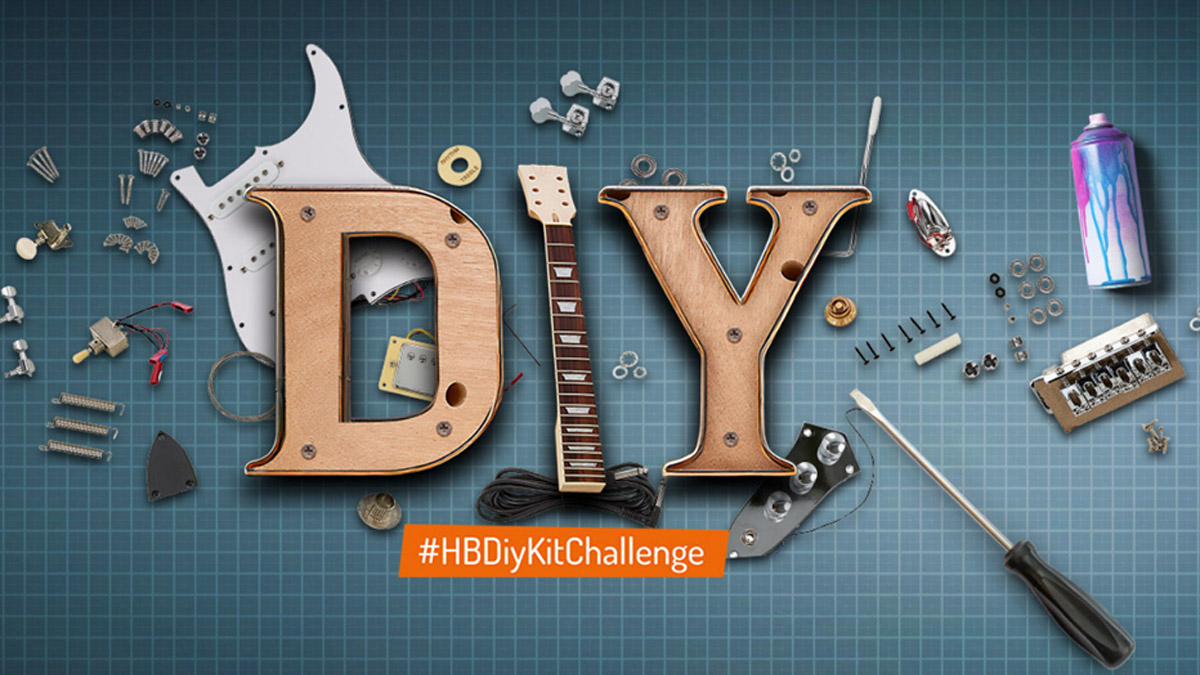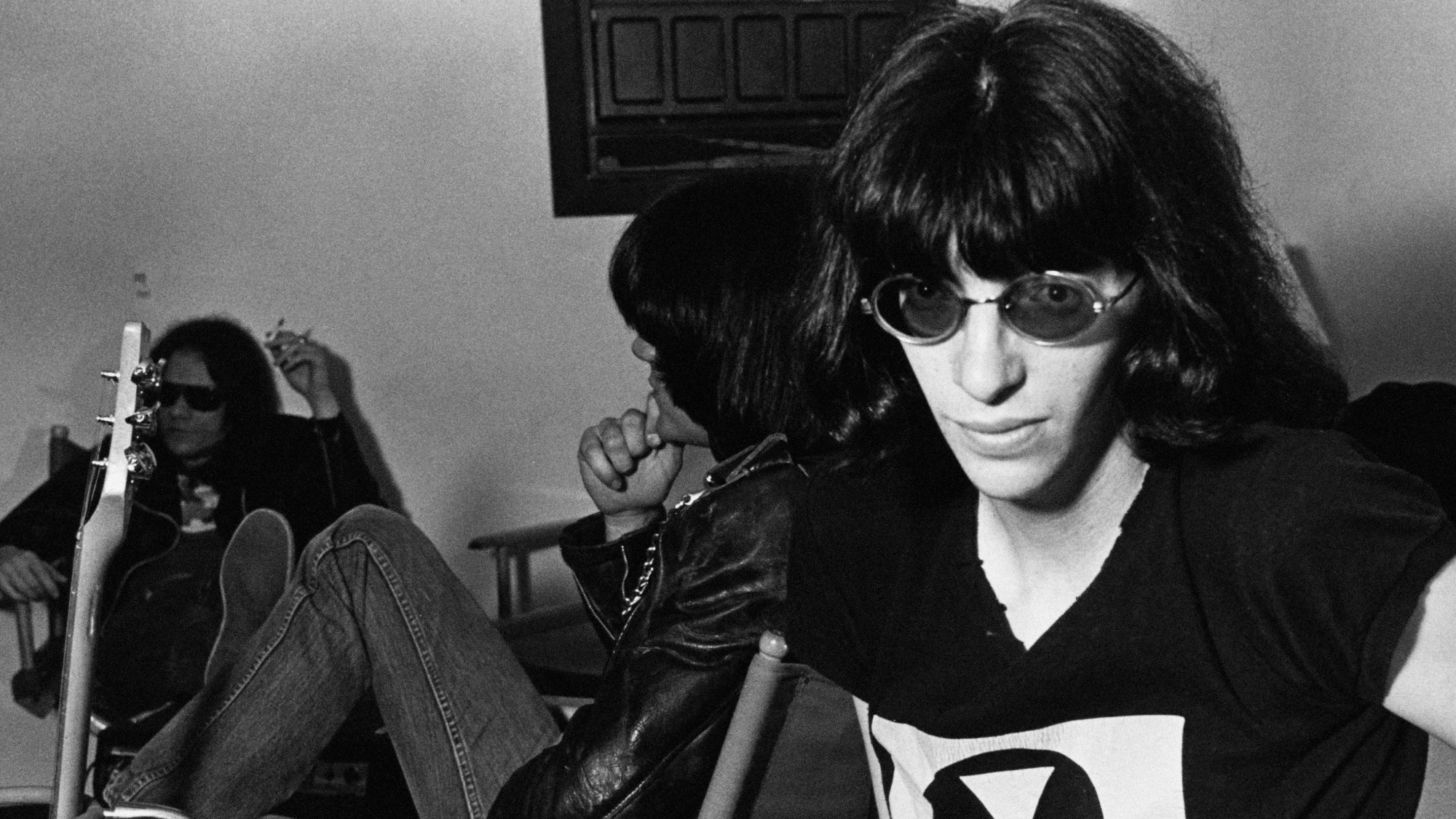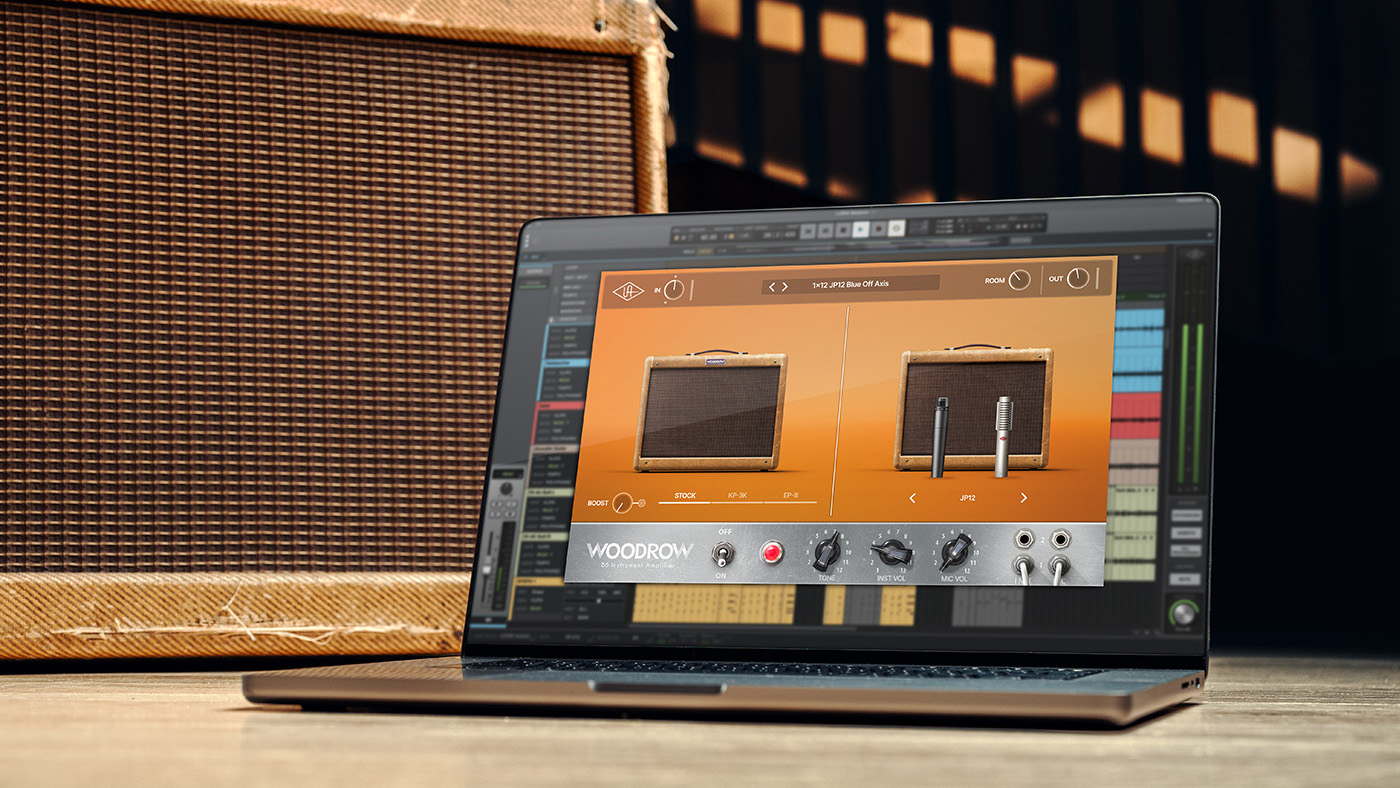"Now it's like one big giant robot made of everybody": Queens of the Stone Age's Jon Theodore on adapting to QOTSA's drumming alumni, a decade in the band and In Times New Roman…
The QOTSA drummer talks In Times New Roman…rediscovering wood drums and firing Dave Grohl's Song For The Dead drum intro into space
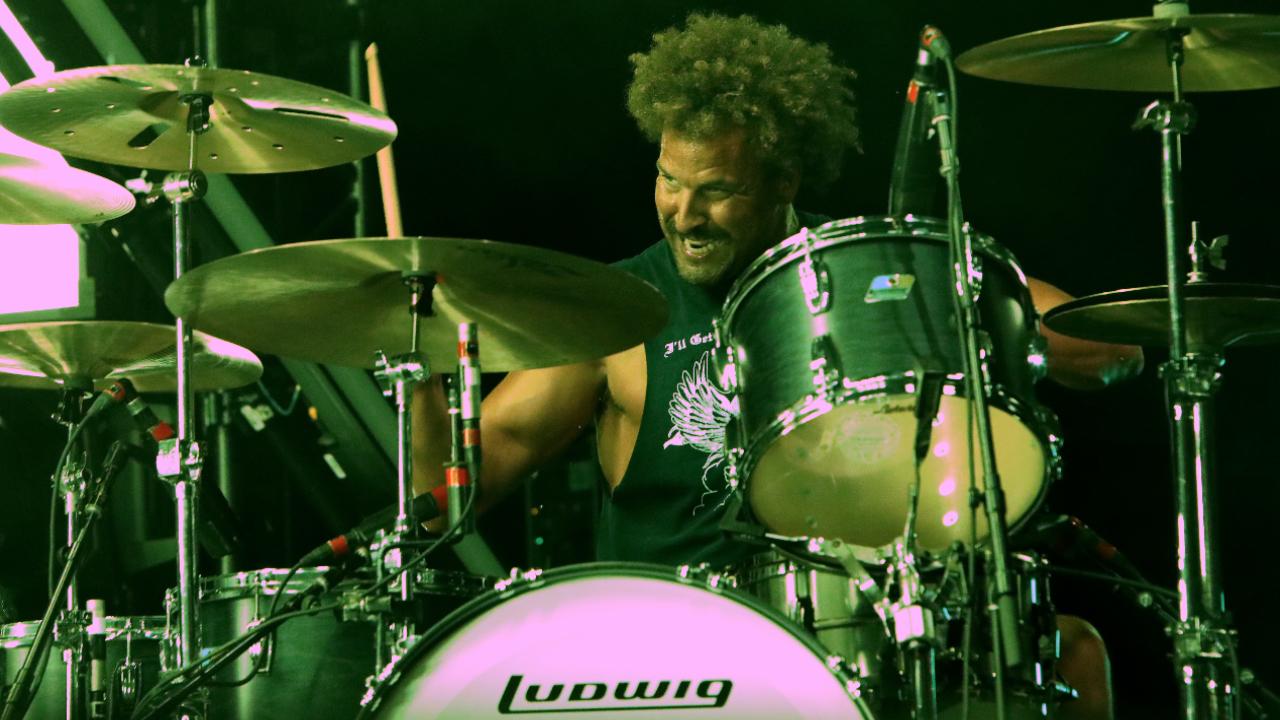
Some bands are defined by a single voice or instrument, be it the frontman, the guitarist, bassist or drummer. Queens of the Stone Age are a band where no matter which way you lean, there’s a wealth of inspiration to be found. It’s a unique sound that holds the Holy Grail of simultaneously appealing to fans of each instrument, as well as producing actual songs that people can sing along with.
But, there’s no doubt that Queens of the Stone Age is every bit a drummer’s band. One that has had a strong pedigree of people holding down the groove. But for 10 years, Jon Theodore has not only held it down — faithfully adopting the styles of the drummers who came before him — but also putting his own stamp on one of contemporary rock’s best-loved catalogues, while also contributing to its continued evolution.
Jon Theodore’s entrance into QOTSA was quick, replacing Joey Castillo at the tail end of the recording sessions for …Like Clockwork — the band’s fifth album that would begin a trilogy of QOTSA records for Matador Records. “Troy called me to say that I should come down” he told us in 2014. “I was like, ‘I’ll be right there’. I brought my drums over in my truck and had a list of tunes to learn…”
Sessions for the album had all but wrapped, with Theodore arriving in time to cut drums on the title track. 10 years on, and he now has two full-lengths to his name with the band: 2017’s Villains, with pop producer, Mark Ronson at the helm, and this year’s triumphant return, In Times New Roman…
The latter was produced by the band themselves, with — by his own admission — a palpable contrast in sound and feel between the two. Both holding equal merit, the former was a heavily refined exercise in sonic and arrangement perfection, while making the latter, according to Theodore was like ‘going into the basement for band practice in the 90s.”
With QOTSA’s The End is Nero tour currently rolling through Europe like a drop-tuned juggernaut, we caught up with Jon Theodore to take stock on the last decade and find out why he’s fallen back in love with traditional wood drums, how Queens of the Stone Age feels “like home” and why he’d choose to shoot Dave Grohl’s intro from Song For The Dead into space…
It’s been 10 years and three album cycles since you joined QOTSA, how do you feel you’ve evolved over this time?
Get the MusicRadar Newsletter
Want all the hottest music and gear news, reviews, deals, features and more, direct to your inbox? Sign up here.
"On a personal level, I feel like it's been a really, super cool evolution. After playing drums my whole life pretty much, to be able to jump right into a whole different ocean. When I joined the band, Like Clockwork was pretty much finished, we just did one track [with me drumming].
"I basically started by going from being a fan of the band to actually learning how to play everything from the first six records. So it was really eye-opening to sort of inhabit each vibe and sounds from all the drummers that have been before me.
"It was a really great chance for me to broaden my horizons in a way that I probably wouldn't have if it wasn't part of the necessary requirements to be in the band. I would say, going from learning everything to actually counting the band in and starting to play it on stage in front of the fans — who at that point knew it better than I did — it's a pretty eye opening experience, just to jump right in.
"When we did Villains, that was the first time I really got to experience the recording process with the band. In much the same way as when I was just learning all the material, it was a very steep learning curve.
"By the time it came time to do In Times New Roman…, I feel like I was able to take all that experience of recording, playing shows, really getting to gel with the rest of the band and the personalities, and really channel it in a way that, for the first time felt like I could really be myself in this framework of being a Queen, you know?
"Things that are challenging and worthwhile take a lot of time. I've certainly put my time in at this point and I'm finally able to kind of, not sit back, but at least enjoy it. I'm really having like more fun now than I've ever had in these past 10 years."
It feels like In Times New Roman… shows off multiple sides of your playing that fans of your other projects will be familiar with too…
"Yeah, I like to play as much as possible, in as many different situations as possible, just because I love listening to all kinds of music. So every chance I get - it's like, if I can play music with someone, that's even more meaningful than just a regular friendship.
"So, I'm always trying to have that interaction. But yeah, I feel like all those other experiences definitely stay with you forever. It just adds to your sort of repertoire and your frame of reference. It just enriches the material from which you can draw when you're working on stuff. It gives you a bigger palette, more colours to work with.
You’re the fifth drummer in the band. Do you still view the different eras as ‘This is a Gene Trautmann part, or a Dave Grohl or Joey Castillo part’? Or does it feel more like your own now?
"Well, I think in a way, I kind of like inhabit…instead of it being a mental or cerebral thing, I've been like internalising it over the years. So I think at this point I've normalised most things into my own sort of approach.
"I play everything from my own vantage point at this point. I think over the years, I've probably internalised the aspects of every other drummer's approach that I think are the most meaningful, or the ones that I can actually honour with my approach.
"At first, it was real cerebral, and I really had to try and adjust to try and approximate the different styles. But now, it's like studying those drummers so carefully has kind of helped me import the parts of their approach that I can really identify and connect with and add them to mine. So now it's like one big, kind of giant robot made of everybody."
Josh Homme is a great drummer, but the thing that makes him so great is that he approaches drums like someone who doesn't play drums.
Jon Theodore
Was there a particular song which predates your time in the band, that was a challenge or a more alien style to what you were used to?
"The way I approach things, every single note that's ever been played before me is its own unique challenge. My goal is to really get into it so deeply that I can that I can try and actually, hear what those players were hearing so that I can really honour it.
"To that end, I didn't prioritise any person or era over any other. They all presented their own unique challenges, and I treated them all with the same level of respect and honour that I could. I just kind of jumped into it all and tried to like to do the best I could in every situation.
"So that's the truth, something that you would consider very simple, didn't always feel simpler to me. Every aspect of [QOTSA's catalogue] presents its own set of challenges, so it's like a never ending kind of challenge. It's fun. I still have to try, you know? Nothing is really that second nature."
Similarly, is there a song or part since you joined that you feel represents your playing the best?
"I don't know, that's hard to say. Because I feel like they're all like, my little children. I love them all for different reasons. I love some of them because it's a version of me that I would never be able to access without the input of these guys.
"Other ones I feel sound more naturally like what I would do if I was alone. I think all of In Times New Roman…, more or less. This new record is definitely my favourite. The main reason is because it was finally a point where we were doing full takes.
"When I listen to it, it sounds like you're standing in the room next to us. There's a very limited number of overdubs, there's only a few songs that took more than two or three takes, so it feels like a real return to the roots of what got me interested in making music in the first place.
"It’s like the way that we used to make music back in the day, when there was just tape machines. You had to be good enough to just cut the song, and then if it wasn't great, you had to do it again until you got it right.
"I feel like, especially in this era of computerised everything, where you can fix everything, it was a real sort of personal triumph to be able to get to the place where I felt confident enough to be able to be loose in the moment.
"There's a lot of things that happened on those takes for the first time, while the tape was rolling. We were so all over each other synergistically that it really sounds special to me. So I guess I would say the whole new record."
How did that way of working compare to making Villains with Mark Ronson behind the desk?
"It was the opposite, in a lot of ways. In Times New Roman… was pretty much just us. For Villains we had Mark Ronson, and we had Mark Rankin. So there were always multiple other inputs.
"We did some unorthodox recording techniques, like tracking the drums without the cymbals. It was really the first time I'd ever approached making a record that way. We really hyper-produced that record. So it was very like hyper-vigilant. It wasn't loose in any way, it was very calculated.
"We spent so much time choosing drums, choosing heads, moving drums from room to room, switching studios. We were always chasing down this sort of perfection. Every drum was considered, every room was considered and we built every song from the ground up. Which bass drum, which snare drum, which rack tom, no cymbals…
"Then, as far as writing and arranging, every single ‘I’ was dotted and ’T’ was crossed, and we did 100 takes of all the songs. We just played it into the ground until it was as perfect as we could get it, and that did something super cool.
"In Times New Roman… was the complete opposite. We were like, ‘This is us. The world is gonna end, let's just turn these lights off and have at it’. That was so liberating. So they were pretty polar opposite in terms of approach."
We weren't spending thousands of dollars a day on a really fancy studio where Jay-Z's in the other room or whatever.
Jon Theodore
That comes through, even in the sound of the kit, they're much bigger, with more tone and resonance…
"Yeah, on Villains we were putting baffling between the drums so that each mic was totally isolated, there were no cymbals. On In Times New Roman… I think, one of the tunes there were like, three mics on the drums. I can't remember which one it was. But yeah, we just took the opposite approach and it was refreshing."
It’s arguably a more riff-y album, and QOTSA drum parts often follow and weave around the riffs closely. Obscenery does this, then opens up into the straighter, off-beat ride pattern. How did that come about?
"That verse beat was Josh's idea. He's got this crazy idiosyncratic approach to drums. He really thinks about it. He's a great drummer, but the thing that makes him so great is that he approaches drums like someone who doesn't play drums. So he's not ever restricted by those sort of 'standards'.
"He had the idea for the verse beat that we worked out. For the most part, the way we approach it is each one of us is going to be like a piston in the motor. We're all going to get specific enough about our parts that when we put it all together it locks up. That's what's special about this band, I think.
"So that part, if you listen to it by itself is kind of elemental and kind of kooky. But when you put it together in juxtaposition with the guitar riff and then the bassline, it makes this cool popcorn that feels like a motor.
"So instantly once we started down that road, it locked itself in pretty quickly. There's a lot of variations in there that I just kicked up during the take that were slightly off balance.
"Then the chorus groove kicking in, it's hard to make the jump conceptually to like, the 'tang and the hump' - the ride bell, you know?! But once you make the commitment to it, then you’ve gotta go all the way in.
"At first we were messing around with just crashing it, and then using a China, and then it became clear that it had to be that offbeat ride thing. Once we got there, it was pretty easy. Then the way those choruses kind of double-time themselves is a cool way to make a variation in what would normally just be a disco beat.
"Not to mention, I used some really super wackadoodle tiny hi-hats that I had no stand for, so I just put them on a stand off by the floor tom. I locked them down, closed super tight. I was like, 'Let me try this!'
"Then within an hour of trying that, we had recorded it. That opened this possibility my brain. It was completely unrehearsed, it was just something that happened in the moment and it ended up opening up this channel in me that made something come down that was unique in the moment."
Negative Space sounds like a lot of fun to play, is that you getting to unleash your inner Bonham a little bit?
"Oh, yeah dude! Again, it was Josh's was idea to play on the rim, instead of a hi-hat. know. As soon as you change the frame of reference, just slightly, it completely deconstructs everything. So suddenly there's all this space in between all these backbeats to do whatever the fuck I want with the bass drum.
"I sort of knew, generally what the beat was supposed to be like, but I didn't really know the arrangement in my brain while we were tracking it. So I was just kind of reacting and feeling my way through the verses.
"The verses were kind of free-styling. But we had really locked that chorus beat down. Same thing, it just came up very quickly. I just have to pretend that like I'm not just trying to be John Bonham!"
The way the drums kick in on Time and Place completely flip where you think the downbeat is. How did that come about?
"Well, that's my favourite thing about Queens, there's a lot of moments that happen like that, and that one came from a demo that Josh made. He was like, 'Here, check this out. I made this demo.' and then the drums dropped. We're all like, 'What?!'
"So once I understood that, I was able to take that and run with it. I tried to basically make it as 'New York City, 1979' as possible. I tried to imagine it was a Talking Heads song, or Liquid Liquid or ESG or something. I wanted to it to be like, 'art school dance party'.
"I would just try and keep it as locked with that bassline as possible, and I tried to only add fills that supported the vocal arrangement. That bridge that happens, the like, dropped bridge in the middle - I remember I just started jamming it.
"Josh was like, 'That's dope. You should do that in the middle.' I think we'd already done a take of the song so it was really a very fresh idea. It's kind of like a miracle that it happened and works. But again, if you had that overcooked, it would sound contrived. So that bridge is another special place for me on the record."
It sounds like you had a lot of freedom to experiment as a band. Do you think self-producing In Times New Roman…at Pink Duck gave you that?
"Definitely. Plus, we weren't consciously spending thousands of dollars a day on a really fancy studio where Jay-Z's in the other room or whatever. Or you know, you drive up, and there's assistants on salary, bringing food. It's a massive production, and it's such a massive expense to go do it in that way.
"But when we do it in our own place it feels like going in the basement for band practice back in the ’90s. So there is a liberating aspect to doing it ourselves. We had Robert Stevenson engineering, and he's a good friend of ours, he's such a pleasure to be around.
"So it was really just us. If it wasn't happening, we just left and came back when it was, so it was like a very natural approach."
Are there any songs from In Times New Roman…that you haven't played live yet that you're looking forward to playing?
"We played Obscenery for the first time last night. I think the only ones we haven't played so far are Sicily and What the Peephole Say. It's funny, normally you make a record and you choose four or five of the new songs, but because of the way this record came down, we could play any of them.
"We've been talking about getting the other two together. Those are the only two left and I imagine we might even play them on this tour. There's so many records now, it's hard. There's so many songs! 10 songs from the new record means we're probably only playing 10 other songs."
You’ve started playing Song For The Dead again after a short break. Obviously that’s a Dave Grohl part, but what’s it like playing such a well known drum intro?
"Dude, are you fucking kidding?! It's fucking iconic, man. Every time I just start the hi-hat. I'm like, ‘Fuck yeah, this is gonna be…’ I can't believe I get to play this fucking song. You know? That intro, for me it's one of the most memorable drum intros of all time.
"The whole song…it's relentless! It just keeps on going. There's so many super cool moments and hooks from the drums there. It's so much fun to play. It sucks that it's last all the time, because I'm already fucking smoked by then and it's one of the more challenging numbers to play, physically.
"We gave it a rest, pretty much for the first time since that record came out. I think it's been the last song of the set for 20 years. But it's always a fucking a dream to play, because it's also one of those iconic Queens songs.
"If you had to make a gold record of Queens to shoot into space, that song would certainly be on it. You could probably just put that song and it’d be fine."
Have you noticed a difference since it had a resurgence with viral social media posts?
"You know, a lot of times people send me stuff like that, but I just don't really like to watch it. Don't get me wrong, I love the internet. I love the socials, but I like to look at mountains and surfing and baby animals and my friends doing stuff.
"But there's this new thing, which is musicians just playing alone in their room, being awesome at something for 15 seconds. It's super impressive, but it's just…Maybe it's because I'm old and I have a kid and another one about to come, but I want music to be memorable.
"I want it to be a song that elevates my spirit or that touches me or something that really resonates. For the most part, just watching a drummer or a guitar player just play another song, that's great. But that's what you do in your bedroom or in your basement.
"So with all due respect, because there's so many incredibly talented people who do that shit, I just couldn't care less. I would rather spend my time looking at like, surfing or motorcycles or baby seals or something."
When I brought the Ludwigs into the room for the first time, everyone was like, 'Holy sh*t!'
You’ve been playing Ludwig drums for a while now, and took part in the Vistalite’s 50th Anniversary promo last year. What’s your current setup?
"I've always loved Ludwig the most, but I never had any new Ludwigs. I had some old ratty wood Ludwig's that wouldn't stand up to any road use. When I joined the band, I only had a vintage Stainless Steel set of Ludwigs, which are still the sickest.
"I had those and a Fibes acrylic set. Josh was like, 'You should get some wood drums.' Someone I knew was like, 'Oh, I know the DW guys.' So I got some new DW's, which are killer, but you know, I've always loved Ludwigs.
"It was great to switch to wood drums as I joined the band, but then as soon as I got the chance, I wanted to move out of that, and I wanted to get some Vistalites. For me Vistalites are only Ludwigs, so I met the Ludwig guy, Uli and I was like, 'Dude, I always wanted to get a set of Vistalites' and he said, 'Call me anytime'.
"So, I respectfully told the DW guys, you know, thank you so much for everything. It's not you, it's me. From there, I wanted to try a wood set that had a really hard bearing edge and projected really well. I hadn't really used wood drums (apart from the DWs) since the '90s.
"I played on a set that my friend had, that I think were Tama. They were just so massive, and they projected and were so crisp and clear. I was like, 'Man, this is incredible'. So I asked Uli, 'Do you have drums that sound like this?' He came to LA and set up a whole shoot-out of drums. I sat down on these Classic Maple drums and instantly I was like, 'Oh my god, this is like exactly…' it was like a revelation for me.
"So he was kind enough to make me some, and it's changed everything for me. I got a bigger bass drum. I don't need any muffling on them, they're tuned wide open and they are just like, clear and loud. They have great tone and they project really well and and they look super dope too.
"They're so good, they're fucking amazing. Actually, when I brought them into the room for the first time, everyone was like, 'Holy shit! What are those drums?' I was like, ‘Yeah, I know’.
A post shared by Ludwig Drum Company (@ludwigdrumshq)
A photo posted by on
"So yeah, that's my new setup. Ludwig, Classic Maple. I'm a purist, I just like the classic sizes. The kick drum is 24”x14”, rack tom is 13”x9”, then the floor toms are 16”x16” and 18”x16”. I’ve used a 14”x6.5” Supraphonic for years. But yeah, I'm pretty much like, standard when it comes to sizes and materials and stuff.
"Then I still have the Zildjian cymbals because my friend Kirsten always lets me turn in all the broken stuff and get whatever new stuff I want! I don't like the super shiny ones, usually.
"I like the ones that are a little more classic, sonically and also visually so playing I'm playing all Ks pretty much. And then the rest of the stuff is the same. I'm still playing Vic Firth sticks and Remo heads. The DW hardware still the best, so I get all that stuff from those guys because they're kind enough to still you know…talk to me even though I don't use their drums anymore.
Do you have electronics in your setup?
"We use Roland triggers on the on the drums to trigger gates at front of house. So we don't trigger any drum sounds, but we use them to control the gates. And then and those run through the Roland TM-6.
"Then I also have the the SPD-SX, because there's a few songs where I have samples like those strings swells in Feet Don't Fail Me Now. I have a second pedal next to my hi-hat, which I use for the claps in The Way You Used To Do.
"I was like, 'Why don't we just record a clap, and I'll play along?' And Josh was like, 'Nope!'. I said, 'I can only play it with my left foot.' and he's like, 'Well do that then!' It's so fucking hard! So, I have to play a clap with my left foot all the time.
"Then sometimes, like in I'm Designer, there's those claps and I hit those on a pad. We don't have any like sequences or click tracks or anything. There's no pre-recorded track stuff. I just have like little accents or other sounds that I hit."
Finally, you’ve been in the band for as long — or longer — than any other drummer. Does QOTSA feel like home?
I'm definitely the best one, ok? Let's just be clear. I'm definitely the best. Just playing! I don't think I've ever been in a band for 10 years. Come to think of it, I don't know if I've done anything for 10 years. Yeah, it feels like home, man. These guys are my brothers and my best friends, they’re the people that I always want to see and hang out with.
"Being part of this, and watching it grow, as we’ve evolved and being more and more involved in the creation of things, I feel very invested. I feel like it's mine. I mean, I feel like it's mine as much as everybody else's. [Laughing] It’s my band, ok?"
Queens Of The Stone Age's ‘The End Is Nero’ Arena Tour Begins In The UK At Manchester's AO Arena on 14th November. Last remaining tickets are available here.
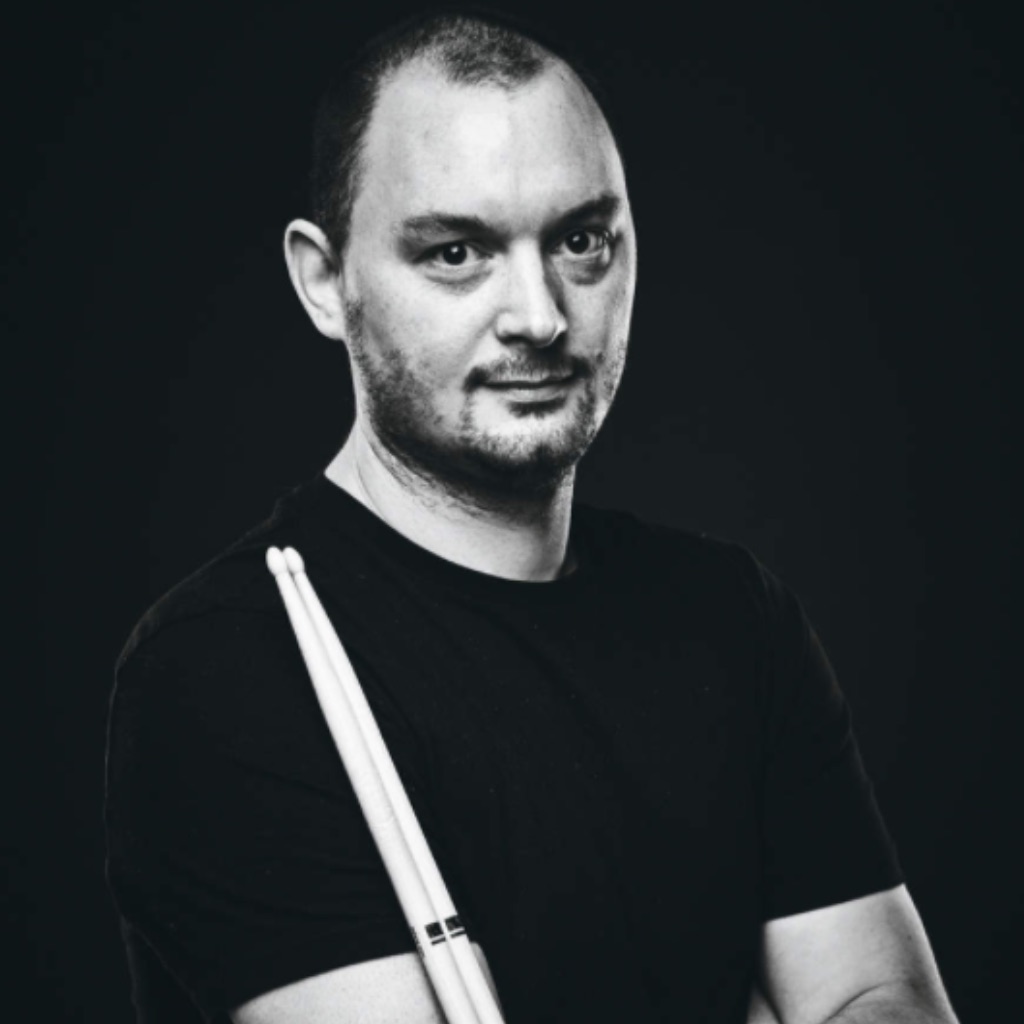
I'm a freelance member of the MusicRadar team, specialising in drum news, interviews and reviews. I formerly edited Rhythm and Total Guitar here in the UK and have been playing drums for more than 25 years (my arms are very tired). When I'm not working on the site, I can be found on my electronic kit at home, or gigging and depping in function bands and the odd original project.

